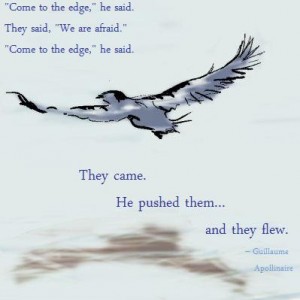THIS POST IS FOR WRITERS:
“Placing the Cart before the Horse”
(Note: If you haven’t read my articles, Passive Voice: A Writing Sin – Part 1 and Passive Voice: A Writing Sin – Part 2, I recommend you do so before continuing with this one.)
I want to clarify what I mean when I say that you must “Place the horse before the cart.”
A writer often creates Passive Voice sentences because his thought processes are out of order. He thinks first of the object, then the act, and finally the subject. Thus, his thought process works something like this:
1) There was this thing, and;
2) Something happened to this thing, and;
3) What happened to the thing was done by this character (if any).
Notice how, in that line of passive thinking, it’s all about the thing. As a result, the writer will likely create a Passive Voice sentence, because the thing is the object of the sentence—the cart—yet he’s thinking about it as the subject.
The writer must correct—re-order—his thought processes to work like this:
4) There was this character, and;
5) This character did something, and;
6) In fact, this character did it to/for/with someone or something.
Notice how, in this new line of active thinking, it’s all about the character. As a result, the writer will likely create an Active Voice sentence, because he has made the character the subject of the sentence—the horse—now in its rightful place.
Thus, the keys are:
A) Subject = Horse
B) Object = Cart
C) The Subject commits the Act.
D) The Act affects the Object.
E) Place the horse before the cart.
F) This is right: “The horse pulls the cart.”
G) This is wrong: “The cart is pulled by the horse.”
Now, like all “rules” of writing, this is not a 100%-er. If you wish to provide special emphasis to a particular segment of the sentence, you might place that segment at the end of the sentence—where the reader best feels the emphasis. However, when you do that, ask yourself the critical questions: Does that closing really punch? Will the reader really feel that? Or did I just create a sloppy sentence for no good reason?
I will now illustrate further through a series of specific examples I’ve seen in pieces I’ve edited. As always, I shall keep confidential the authors’ names and story titles, to protect the not-so-innocent. [Insert chuckle here.]
BAD: Midsummer’s earthy colors of the landscape were dominated by dots of green.
(Note: These “reversed order” Passive Voice sentences typically run long. Another benefit of Active Voice sentences: they run shorter. In this example, I cut the 12-word original by 25%, down to 9 words.)
GOOD: Dots of green dominated the landscape’s midsummer earthy colors.
BAD: Adjustment was expedited when the captain called for a meeting with the ninety-two passengers on the second day out.
(Note: The author started the sentence with the object.)
GOOD: The captain expedited adjustment when he called for a meeting with the ninety-two passengers on the second day out.
BAD: The wound had been made, and now the men could not be placated by my yielding.
GOOD: I’d already inflicted the wound, and I would not placate the men now by yielding.
BAD: Outside, the soft rattle of pebbles dragged back down the beach was pierced by the aching cries of the gulls that arced and skimmed above the foam.
(Note: This is a difficult sentence on a number of levels. Read it aloud. You might decide, as I did, that the reader would appreciate a chance to catch his breath. Work it through in a couple of steps if necessary. First [GOOD], kill the Passive Voice. Then [BETTER], aim for the best possible structure.)
GOOD: Outside, the aching cries of gulls, which arced and skimmed above the foam, pierced the soft rattle of pebbles dragged back down the beach by the tide.
BETTER: Outside, gulls arced and skimmed above the foam, and their aching cries pierced the soft rattle of pebbles dragged back down the beach by the tide.
BAD: Our band was chosen for the gathering by the other band’s elders.
GOOD: The other band’s elders chose our band for the gathering.
In closing, please indulge me as I remind you once more to make these your watchwords: Keep it strong and direct!
‘Til next time, remember this: Writing well is not easy. It takes work. You mustn’t be lazy.




Leave a Reply